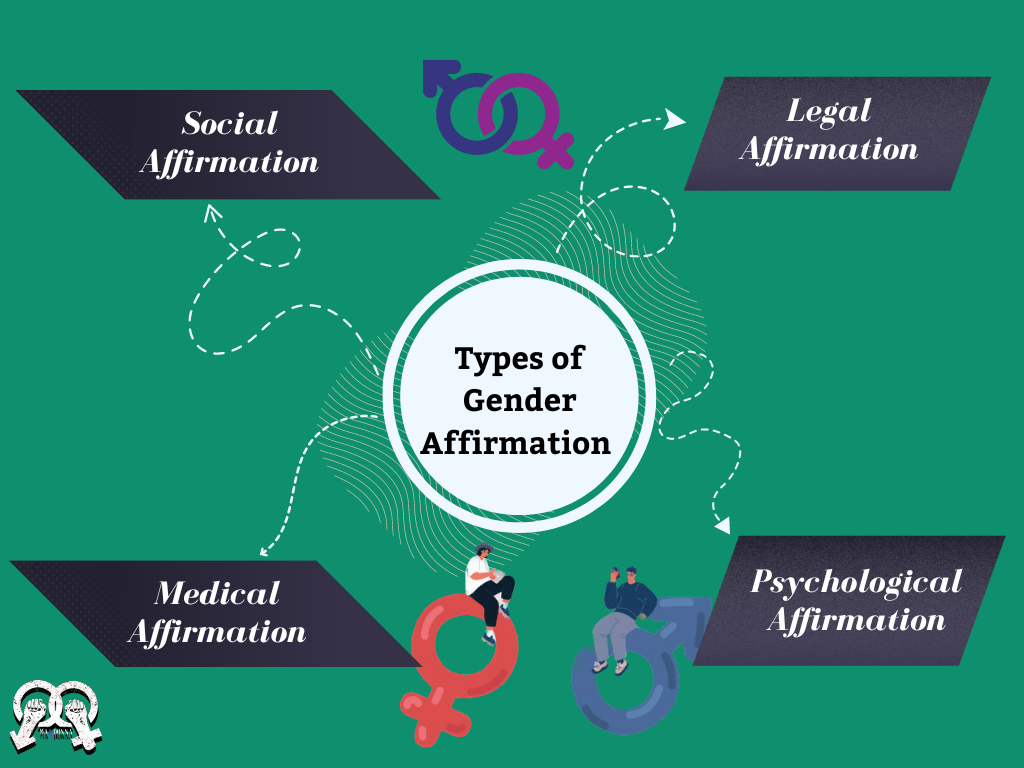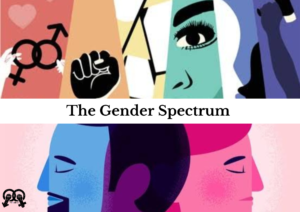What is Gender Affirmation?
Gender affirmation constitutes a comprehensive framework encompassing a diverse spectrum of actions and opportunities necessary for individuals to authentically manifest and thrive within their self-identified gender identities. The experience of gender affirmation is profoundly individualised, shaped by the subjective nuances of personal affirmation, safety considerations, and the constraints imposed by accessibility and resource availability.
The concept of gender affirmation recognises the intrinsic diversity of transgender individuals’ journeys and underscores the pivotal role of tailoring affirming experiences to the unique needs and aspirations of each person. This multifaceted process prioritises the alignment of external and internal gender expressions with an individual’s gender identity. It extends beyond mere societal acceptance and encompasses the broader facets of personal well-being, encompassing psychological, social, and physical dimensions.
Is there only one way to affirm your gender?
It’s a widespread misconception that gender affirmation or transitioning is a straightforward journey from one point to the other. In actuality, the process of affirming one’s gender is incredibly diverse, and there’s no fixed roadmap for it. There’s no “one-size-fits-all” approach, and there’s no right or wrong way to go about it.
Gender affirmation takes on a multitude of forms, and each person’s journey is uniquely their own. It’s more like a mosaic of experiences rather than a linear path. What’s most important is that individuals have the freedom to explore and express their gender identity in ways that feel most authentic and comfortable to them.
Types of Gender Affirmation

Credits: Nayan Sushil, Graphics Intern at Mandonna
Social Affirmation: Social gender affirmation encompasses various aspects of an individual’s life where they align with their identified gender. This can involve living full-time or part-time in their affirmed gender, adopting a new name or pronoun, dressing in a manner consistent with their gender identity, and disclosing their gender or transgender experience to others. For many transgender individuals, social gender affirmation represents the initial and sometimes the primary step in their journey towards self-authenticity.
Research has highlighted the significant impact of social gender affirmation on the mental well-being of transgender individuals. Positive mental health outcomes have been associated with engaging in these affirming behaviours. However, it’s crucial to acknowledge that social gender affirmation, particularly in the form of disclosing one’s gender identity, can also expose individuals to challenges such as discrimination and the experience of transgender stigma, which can have detrimental effects on their mental health.
Legal Affirmation: Legal gender affirmation encompasses the process of updating one’s personal identification documents, such as social security cards, birth certificates, and driver’s licenses, to accurately reflect their affirmed gender identity. This essential aspect of gender affirmation ensures that an individual’s legal records align with their true gender, promoting inclusivity and recognition in various societal and legal contexts.
By amending these documents, individuals gain access to the rights and privileges associated with their affirmed gender, reducing the risk of misidentification and discrimination. Legal gender affirmation not only enhances one’s sense of self but also contributes to their ability to participate fully in civic life, employment, healthcare, and other fundamental aspects of society. It serves as a pivotal step towards creating a legal framework that respects and acknowledges diverse gender identities, fostering a more equitable and inclusive society.
Medical Affirmation: When it comes to gender affirmation, some aspects often involve collaboration with medical professionals. This collaborative process can include various interventions aimed at aligning an individual’s physical characteristics with their gender identity. These interventions encompass hormone therapy, which may involve taking hormones like estrogen, testosterone, or progesterone. Additionally, for individuals at earlier stages of development, puberty blockers can be a crucial option to temporarily pause the physical changes associated with puberty, affording more time for gender exploration.
In some cases, individuals may opt for affirmative surgeries, which can encompass a range of procedures. These surgeries may include chest surgery to masculinise or feminise the chest, genital surgery to align one’s physical anatomy with their gender identity, or facial surgeries to address features that may not align with their affirmed gender presentation.
Psychological Affirmation: Within the transgender and gender-diverse community, psychological gender affirmation represents an intrinsic process characterised by profound self-acceptance and appreciation of one’s identity. This multifaceted concept entails valuing oneself as a transgender or gender-diverse individual, cultivating a deep sense of comfort with one’s gender identity, and experiencing contentment with one’s body and chosen gender expression.
Psychological gender affirmation transcends external perceptions and societal expectations, underscoring the importance of self-empowerment and self-love. It involves embracing one’s authentic identity and nurturing a positive relationship with one’s own body and self-image. This process is integral to the holistic well-being of transgender and gender diverse individuals, as it fosters resilience, self-confidence, and a genuine sense of belonging. Ultimately, psychological gender affirmation is a vital component of the journey towards a more inclusive and affirming society, where individuals can thrive in their diverse gender identities.
Barriers to Gender Affirmation
Gender affirmation faces a range of challenges and barriers across social, legal, medical, and psychological dimensions. Socially, stigma, discrimination, family rejection, and violence pose significant obstacles to transgender individuals. Legally, bureaucratic hurdles, lack of protections, and limited access to gender-affirming healthcare can impede legal gender affirmation. In the medical realm, healthcare disparities, cost and access issues, and gatekeeping practices can hinder access to gender-affirming care. Psychologically, internalised stigma, mental health disparities, and a lack of self-affirmation can negatively impact the well-being of individuals seeking gender affirmation.

Credits: Pinterest
Addressing these challenges necessitates comprehensive efforts, including legal reforms, improved healthcare access, and educational initiatives to foster understanding and acceptance of transgender individuals. Supportive policies, affirmative healthcare practices, and community networks are crucial in mitigating these barriers and creating a more inclusive and affirming environment.
Support and Resources
Here is a list of organisations that provide a wide range of services for gender-affirming care:
Mitr Clinic: Mitr Clinic offers comprehensive care for transgender and gender-diverse individuals in India. Their services encompass gender-affirming healthcare, counselling, legal assistance, and social protection services. They focus on addressing the unique healthcare needs of transgender individuals, ensuring access to gender-affirming medical care.
Mitr Clinic also provides a safe and supportive environment for individuals seeking gender affirmation services.
Link to their Website: https://www.safezindagi.in/mitr-clinic#:~:text=Mitr%20Clinic%20provides%20care%20through,aid%2C%20and%20social%20protection%20services.
Humsafar Trust: Situated in Mumbai, The Humsafar Trust is one of India’s oldest LGBTQ+ organizations. Their services encompass a wide range of healthcare initiatives:
Health Education: The organization raises awareness within the LGBTQ+ community about health risks, including HIV, STIs, OIs, and other comorbid conditions.
Mental Health Support: In addition to physical health concerns, they also address mental health issues, recognizing their significance.
Training for Families: The Humsafar Trust offers training modules to educate parents and loved ones of queer individuals, fostering a better understanding of healthcare needs within the LGBTQ+ community.
Link to their Website: https://humsafar.org/
Naz India Foundation: Naz India Foundation, a non-governmental organization, dedicates its efforts to addressing HIV/AIDS and health disparities within marginalized and LGBTQIA+ communities. Their mission revolves around fostering inclusivity and equity within society, with key objectives including:
Prevention and Support: They actively promote HIV/AIDS prevention and provide support to individuals living with the condition.
Advocacy: They are strong advocates for policy changes that safeguard the rights and well-being of those affected by HIV/AIDS.
LGBTQIA+ Support: The organization offers comprehensive support, including counselling and access to gender-affirming healthcare, to LGBTQIA+ individuals.
Link to their Website: https://www.nazindia.org/
Transgender India: Transgender India plays a significant role as an online hub catering to the needs of transgender individuals in India. This platform serves as a crucial resource offering information, support, and opportunities for community engagement. Within this digital space, transgender individuals find a means to connect with others who share their experiences, while also gaining access to pertinent information related to their gender identities, legal rights, healthcare options, and broader well-being concerns.
Link to their Website: https://transgenderindia.com/
References
What Is Gender Affirmation?” TransHub, 2021. https://www.transhub.org.au/101/gender-affirmation.
Coleman, Eli, Walter Bockting, Marsha Botzer, Peggy Cohen-Kettenis, Griet DeCuypere, Jamie Feldman, Lin Fraser et al. “Standards of care for the health of transsexual, transgender, and gender-nonconforming people, version 7.” International journal of transgenderism 13, no. 4 (2012): 165-232.
Levitt, Heidi M., and Maria R. Ippolito. “Being transgender: The experience of transgender identity development.” Journal of homosexuality 61, no. 12 (2014): 1727-1758.
King, Wesley M., and Kristi E. Gamarel. “A Scoping Review Examining Social and Legal Gender Affirmation and Health among Transgender Populations.” Transgender Health 6, no. 1 (2021): 5–22. https://doi.org/10.1089/trgh.2020.0025.
TransHub, 2021. https://www.transhub.org.au/101/gender-affirmation.
Sevelius, Jae M., Deepalika Chakravarty, Samantha E. Dilworth, Greg Rebchook, and Torsten B. Neilands. “Measuring Satisfaction and Comfort with Gender Identity and Gender Expression among Transgender Women: Development and Validation of the Psychological Gender Affirmation Scale.” International Journal of Environmental Research and Public Health 18, no. 6 (2021): 3298. https://doi.org/10.3390/ijerph18063298.
Safer, Joshua D., Eli Coleman, Jamie Feldman, Robert Garofalo, Wylie Hembree, Asa Radix, and Jae Sevelius. “Barriers to Healthcare for Transgender Individuals.” Current Opinion in Endocrinology, Diabetes & Obesity 23, no. 2 (2016): 168–71. https://doi.org/10.1097/med.0000000000000227.
Authorship Credits
Paarth Pande is a liberal arts graduate from Symbiosis University, Pune and a research intern at Mandonna





